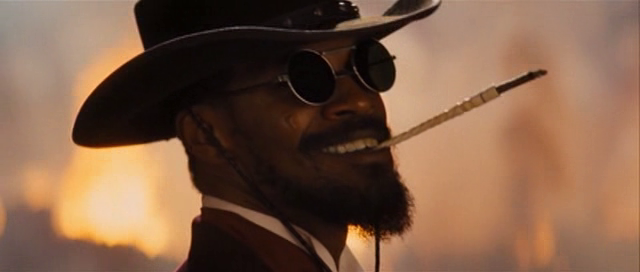
Django Unchained: “Negro from necro, meaning death: I overcame it so they named me after it.”
January 12th, 2013 Posted by david brothers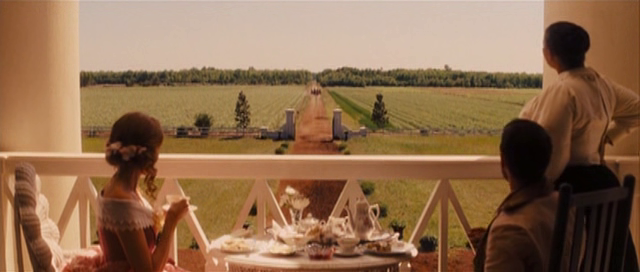
A brief burst of things I couldn’t fit into the jillion words I’ve written about Django Unchained since I saw it:
-Part of writing about Django Unchained is reading about Django Unchained. That was interesting, but it also sorta sucks. There’s a lot of pearl clutching over Quentin Tarantino daring to write the word nigger in a movie set during slavery times, whether it’s disrespectful… I thought this piece from io9 was particularly bad, on account of it suggested that Django Unchained was a white man’s fantasy without ever mentioning that basically every black person ever has had that conversation that goes “Boy, if I was around back then, I’da taken that whip from massa and shown him what a slave looks like.” (The point at the end about Django in the blue suit is weirdly infantilizing and emasculating, too.)
I picked up on a few things that most of the essays I hated did. The first is that they expected Django Unchained to have a moral, like it was Roots or something. Another was that they looked at Hildi and thought she was some type of passive damsel in distress, instead of somebody who was continually trying to escape from bondage, no matter the price she paid. That’s passive? Nah, son. She was having adventures elsewhere while Django was coming to get her. (I’d watch that movie.)
The biggest warning sign, and the only one that’s not me being petty and overly concerned with my own rightness, is when people start talking about the n-word. Does Quentin Tarantino use the n-word too much? Is it controversial for Leonardo DiCaprio to say the n-word?
Basically, if you are utterly incapable of saying the word nigger, you shouldn’t be talking about the word nigger. It’s dishonest to have that discussion and not treat the word as a real thing. I get the reasons why — you don’t want to offend people, it’s ugly, and so on — but if you’re having this conversation? You’re going to have to approach it on its own terms. I don’t think I liked a single essay that was n-word this or n-word that.
We’re adults, right? Adults use words, understand the history of those words, and understand that painful words can be used in certain contexts without offense.
So either do it or don’t, but don’t do it halfway. You want to have that conversation? Cool. Put on your adult clothes and have it.
Until you can do that, it’s grown folks talking. Shut your yap.
-I can’t tell you how happy I am that Tarantino got Anthony Hamilton on the soundtrack. The John Legend song is super hard — “Now, I’m not afraid to do the Lord’s work/ You say vengeance is his but I’ma do it first” YO! SON!!!!! — but Hamilton is that dude. He’s like… I keep comparing him to Curtis Mayfield, which is unfair and limiting. But Mayfield is legendary to me. I could listen — more like “have listened,” I’m not even kidding here — to Superfly
or Curtis or whatever for weeks at a time. Mayfield poured so much emotion and heart into his music that I just can’t get enough of it, no matter how many times I try to sing along to “Freddie’s Dead” and can’t hit the notes.
Hamilton is that dude to me nowadays. His latest album, Back To Love, is a straight tear jerker, but on that strong black man tip. It’s real soulful, and it’s real on a level that most people just cannot match these days.
When I think of people who should be singing about the black American experience more than any other person who is currently alive, it’s Anthony Hamilton. And Django Unchained needed his voice. The result is “Freedom,” a collab with Elayna Boynton, which you should listen to as you read the rest of this joint:
I know I’m talking a lot about Hamilton and not his duet partner, but trust: Boynton is a powerhouse, too. This is my introduction to her, but come payday, I’m going to find more. Her voice is amazing, that perfect mix of weathered and hopeful. Like Macy Gray + Norah Jones? I don’t know. She’s great. She sells it. She keeps up with my favorite sanger.
-Using anachronistic music was a good choice on Tarantino’s part. Setting aside the indisputable fact that there was no good music before DJ Jazzy Jeff and the Fresh Prince’s He’s The DJ, I’m The Rapper, using modern music further removes Django Unchained from being a boring, depressing, sadface slavery movie. We’re meant to enjoy this film, and the music goes a long way toward opening us up to do just that.
-“I need one hundred black coffins for one hundred bad men…” The needle dropping on that song had me fanning myself in the theater like I was in church.
-I’m incapable of objectively judging that Tupac/James Brown mash-up, mostly because they took one of the hardest JB joints and merged it with a tight Pac verse. What am I supposed to do, not like it?
-I don’t know who Brother Dege is, but “Too Old To Die Young” is great, too.
-Hildi’s last name is von Shaft, or maybe von Schaft. Regardless, Tarantino has suggested that she and Django are John Shaft’s ancestors. I like this a lot, in part because it creates a lineage for Shaft that I want to know more about. I’m used to the idea that I won’t get to know much about my ancestors past I think the mid-1800s, but I can’t tell you how obsessed I am with the idea of knowing everything. Knowing about the men and women whose existence and actions led to me… I don’t expect the Shaft line to be filled with crime fighters and crusaders — I figure Django and Hildi retired after getting out — but I want to know more.
-The first time I saw Django Unchained, I was with my cousins, none of which are as into action flicks as I am, so I had no one to debate the possibility that Tarantino beat the climactic gunfight in The Killer during the massacre at Candyland. The second time I saw it, I still didn’t have anyone to debate it with, but I realized it doesn’t need debating at all. He beat it. That shot of Django discarding one gun during the fight is everything I wanted.
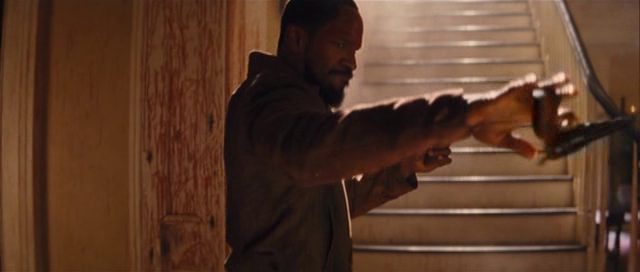
-I love that Tarantino weaponized Alexandre Dumas. I didn’t know Dumas was black (black-ish — black enough for the Klan to want to lynch him, at any rate) for years, and I love that that fact was used to slam racism and faux-intellectual culture. Calvin Candie doesn’t know anything. He’s a dilettante.
-As a result, the second-best line of the movie was “D’Artagnan, motherfucker!” when Django kicks in the door with his guns blazing. It’s vengeance and guilt, all wrapped up in one. Django was partially responsible for D’Artagnan’s death, he let it happen, so he comes back around to make it right. How does he do it? By striking in his name.
-I’ve seen a lot of people talk about how docile the slaves were in this movie, to the point where I wonder if folks saw the same flick I did. In the mandingo fight that introduces Calvin J Candie, only the whites are watching the battle. The negroes are looking away — Sheba is entirely turned away from it! — and the bartender is focused on something else. Lil Jody, breaker of eggs, watches Django with surprise by way of a hilariously placed mirror while she’s tied to a tree. The servants in Candyland during the dinner keep looking at Django like “Is this nigga for real, why does he think he can get away with this?” At the end, with the dudes in the cage? They don’t fail to leave their cage because they’re cowed and scared. They just saw a black dude murder like 80 white people, talk his way out of bondage, kill two more white dudes, blow up another, hop on a horse, take some dynamite, and ride away. That’s like eighty unthinkable things in a row, so it’s no wonder they stayed in the cage and just watched him. They were shocked. Shoot, I’d sit there, too.
Throughout the movie, the slaves pay a lot of attention to Django. They’re watching. They know how far they can push, but if they see someone else pushing? They’ll push harder.
You know the beginning of the movie, when the slaves kill that last Speck brother? They’re silent and shocked, too. They’re shocked because this ain’t the way of things, but once they’re given an option, what do they do? They choose to punish their tormentor and escape to freedom. It sets the tone for Django and Schultz’s interaction with everyone else in the movie.
Now, what do you think all those suddenly masterless slaves at the Candyland plantation and Big Daddy’s big house are doing now? Picking cotton? Nah, son.
–Django Unchained is seriously funny. “That’s not what I meant” got the biggest laughs at my first showing, back home in Georgia. It deserves it.
-Django is forced to choose between himself and his race, and that’s real interesting. His love for Hildi lets/helps him do terrible things to people. That’s a tough row to hoe.
-It’s not a slave revenge movie. It’s a movie where a slave takes revenge, yeah, but it’s not Inglourious Basterds. You can’t kill slavery as easily as killing Hitler. It was an institution that was propped up by the government, the citizens, and the culture. Hitler and his closest goons were figureheads, so you could theoretically force real change by taking them down and then taking advantage of the snake having no head. Who’re you gonna kill in 1858 to kill slavery? Everyone?
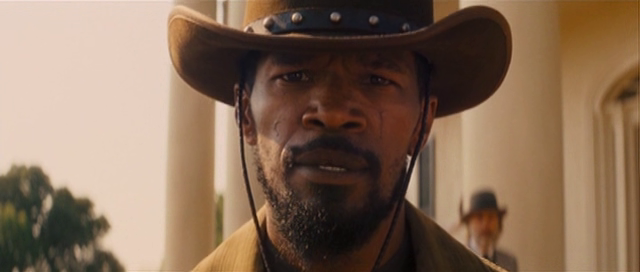
-I like that Schultz, our outsider character, loses his patience when he’s finally confronted with the real horrors of slavery. He did something to someone that they definitely deserved, but he did it at an exceedingly poor time. But, because of the bond between him and Django, he knows that if anyone can survive the aftermath of his temper tantrum, it’s Django. “Sorry. I couldn’t resist.”
And Django does. The only thing holding him back? Ammunition.
-I figure that Hamilton song is over now, yeah? Here’s Brother Dege’s “Too Old to Die Young” to wrap things up:
-Walton Goggins is one of my favorite actors, and he’s been entirely typecast as playing racists. To my recollection, the last time I saw him in a role that wasn’t a racist was in The Bourne Identity as a computer analyst, who may well have been a secret racist when not at work. But Miracle at St Anna, The Shield
, Justified
, Predators
… this guy regularly plays one of my least favorite types of people and I love him every single time.
He’s such a good actor that the racism of his characters is beside the point. He brings a real human touch to these people we usually look at as being fairly black & white or cartoonish. And his swagger as Billy Crash — best name in the movie, by the by — is incredible. There’s this shot late in the movie where several shadowed people are walking down a path. You can’t see their faces or any details, but that dude in the middle? You can tell he’s Billy Crash by how he walks.
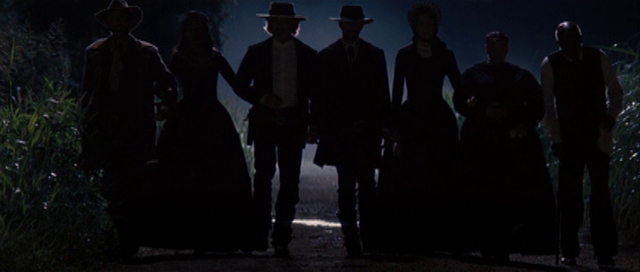
Goggins is stunning and a show-stealer, every single time. I’ll follow that guy just about anywhere at this point. I wish there was some link between Cletus van Damme and Billy Crash, but all I have to go on now are my daydreams.
You can’t underrate this dude. He’ll rock any role you give him.
-I liked this movie.
-I should have talked about Hildi more. Sorry.
-Thanks for reading.
